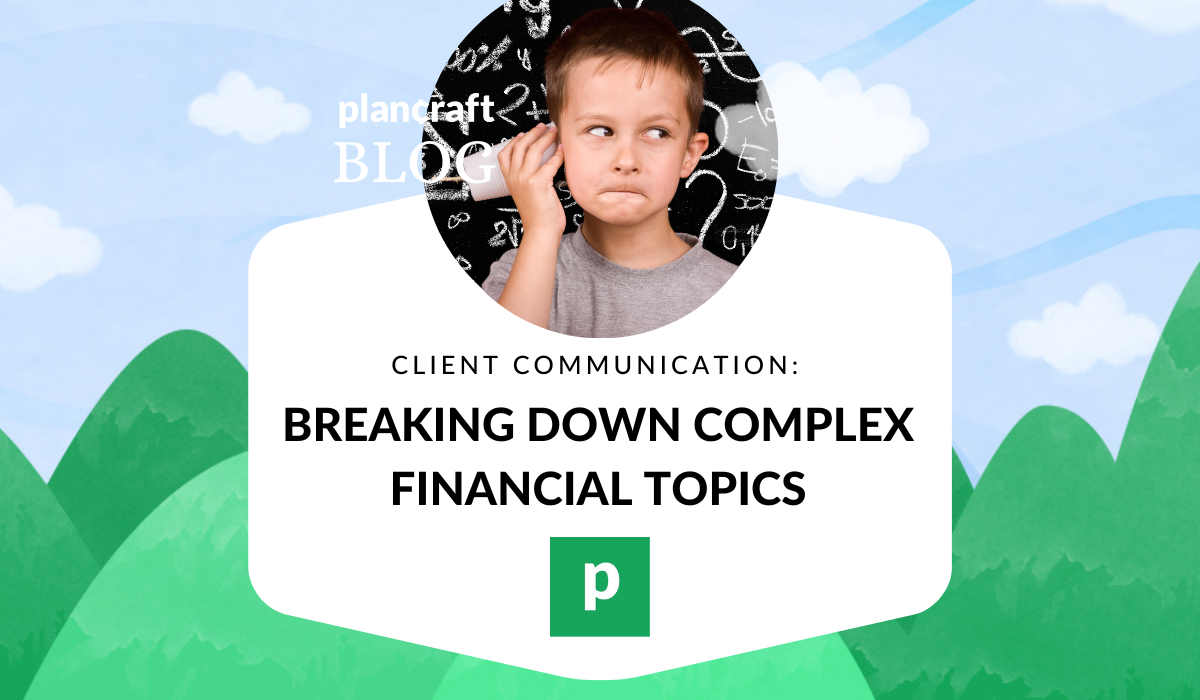Delving deep into personal finance topics is second nature for financial advisors. But an often-overlooked skill is the art of translating this intricate knowledge into easily digestible information for clients. Much like a chef who takes raw ingredients to create a gourmet meal, advisors must take complex financial concepts and present them in a way clients can not only understand but also apply to their real-life financial decisions.
The significance of this can't be overstated. In the financial world, understanding is the bedrock of trust. The more a client comprehends, the more confident they'll feel in both their financial decisions and their choice of advisor. Every interaction, every explanation, and every discussion is an opportunity to fortify the foundation of trust. Effective client communication isn't about watering down concepts but about presenting them in an accessible way.
Client relationships thrive when advisors prioritize clarity. It's essential to recognize that not every client comes with the same background or understanding of financial jargon. Every client is unique, with distinct financial goals and experiences that shape their perspective. As advisors, our role is not just to guide but also to educate. And that education is most effective when tailored to meet each client where they are.
In the end, while staying updated on market trends and investment strategies is crucial, the real impact is made when those insights are shared through clear and effective client communication. After all, the primary goal is not just to devise sound financial plans but to ensure clients fully understand and embrace them.
Techniques for Communicating Complex Financial Topics
- Use Analogies and Metaphors: Drawing parallels between financial literacy topics and everyday scenarios can make complex subjects more relatable. For instance, you might compare asset diversification to not putting all your eggs in one basket or explain cash flow using the analogy of water flowing in and out of a reservoir.
- Visual Aids: Charts, graphs, and infographics can visually represent data and trends, making it easier for clients to grasp the bigger picture. For example, a pie chart can succinctly show how one's monthly expenses are divided, emphasizing areas where they might consider saving money.
- Break It Down Step-by-Step: When discussing a complex topic like a mortgage or investment strategy, go through each aspect one at a time. This incremental approach allows clients to absorb information in manageable chunks.
- Interactive Tools and Simulations: Leveraging digital platforms to provide interactive financial education can engage clients more dynamically. Online calculators or budgeting tools allow them to play with numbers, seeing firsthand the effects of different financial decisions.
- Storytelling: Sharing real-life examples or hypothetical scenarios can illuminate abstract financial concepts. Telling a story about a person who didn't plan their cash flow effectively versus someone who did can drive home the importance of budgeting.
- Encourage Questions: Make sure your clients know that no question is too basic. By fostering an environment where they feel comfortable asking about anything they don't understand, you ensure that they're truly grasping the financial education you're providing.
- Reiterate Key Points: As you're communicating effectively about a topic, circle back to the main points once or twice to reinforce them. Repetition aids retention, especially with complex subjects.
- Provide Take-Home Materials: Handouts, booklets, or digital resources can serve as reference materials for clients to review at their own pace, further solidifying their understanding.
10 Financial Planning Topics to Ensure Clients Understand
- Compound Interest: While it's often said that compound interest is the eighth wonder of the world, not every client will instantly grasp its power. Explaining how money can grow over time and how reinvesting interest leads to even greater gains can provide clarity.
- Tax Implications: From capital gains to IRA withdrawals, taxes can significantly impact a client's returns. It's essential to outline the various tax scenarios and how they can affect financial decisions.
- Risk vs. Reward: Every investment carries some level of risk. Distinguishing between different investment types and their associated risks can help clients make informed choices based on their tolerance and financial goals.
- Asset Allocation and Diversification: The strategy of spreading investments across various assets to reduce risk might seem straightforward, but diving deeper into why and how can empower clients to feel more confident in their portfolios.
- Retirement Planning: From 401(k)s to Roth IRAs, the world of retirement planning is vast and varied. Breaking down the differences, benefits, and potential drawbacks of each can help clients better navigate their golden years.
- Estate Planning and Inheritance: It's not just about wills. Discussing topics like trusts, estate taxes, and the nuances of passing on wealth can provide clarity in a complex area of personal finance.
- Time Value of Money: The idea that a dollar today might be worth more than a dollar tomorrow is foundational in finance. Helping clients understand this principle can aid them in making sound financial decisions.
- Inflation's Impact: Over time, the cost of living typically rises. Breaking down how inflation erodes purchasing power can help clients plan for future expenses more effectively.
- Active vs. Passive Investing: While some clients may prefer to actively trade, others might lean towards passive strategies. Explaining the pros and cons of each approach ensures they're making informed decisions.
- Debt Management: Whether it's mortgages, student loans, or credit card debt, understanding interest rates, repayment terms, and the long-term costs associated with borrowing is crucial for financial well-being.
Client Education: A Lifetime Project
Educating clients on intricate financial topics isn’t something you achieve in a single meeting. It's a continuous process, one that evolves alongside your client's ever-changing financial landscape. As with any long-term project, patience and consistent effort are vital.
Imagine diving deep into the nuances of a savings account or the intricacies of health insurance in a single phone call. Overwhelming, right? Instead, it's more effective to introduce these topics gradually. For instance, one month you might discuss the basics of a savings account - its purpose, benefits, and how it differs from a regular bank account. The next month, you could delve into health insurance options, explaining how making the right choice could save thousands of dollars in the long run.
Active listening plays a crucial role here. By tuning into your clients' concerns, you can pinpoint which topics to cover next, ensuring your guidance remains relevant and timely. For instance, if a client expresses uncertainty about investing or wonders about the benefits of various bank accounts, you can address those subjects in upcoming sessions.
Furthermore, utilizing a feedback loop is crucial. Regularly check in to gauge your client's understanding and comfort level. Feedback can come through a simple phone call, an email survey, or even through interactions on social media. It's about building a two-way street of communication where clients feel empowered to voice their doubts, questions, or even share their success stories.
And remember, financial education is a journey, not a destination. As the market evolves, new topics will emerge, requiring further clarification. By committing to lifelong learning and engagement, you ensure that your clients are always equipped with the knowledge they need to make sound financial decisions.
Better Conversations = Better Client Relationships
The journey of simplifying financial topics for clients is indeed a noble endeavor, one that not only builds trust but also cements the advisor-client bond. Effective communication is an art, and when mastered, it can make the difference between a one-time consultation and a lifelong client relationship.
In this era, where the market is saturated with countless products and services, standing out requires offering unparalleled value. Planswell is one such service aiming to transform the financial advising landscape. This platform has been meticulously crafted to support advisors in having more meaningful, transparent, and productive conversations with their clients. By utilizing such a product or service, advisors can elevate their client communication strategies, ensuring that their advice resonates, and their insights are effectively understood.
In the end, it's all about empowering clients to make informed financial decisions. With the right tools and techniques, advisors can indeed change lives, one financial conversation at a time.









